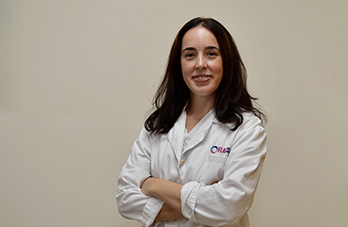
"The involvement of the surroundings in the therapy process is vital for treating a mental disorder"
Interview with Sara Mayero, Head of the Psychiatry Area at the Hospital HLA Universitario Moncloa
What are the causes of disorders such as depression or anxiety?
Most psychiatric disorders have no specific cause. In the case of Depressive and Anxiety Disorders, genetic, environmental and psychological factors are the main influences. That is to say, family background, the patient’s social environment and their personality are important influences.
Why are the cases of depression and anxiety rising amongst Spaniards?
In my experience, this increase has to do with two aspects: the first one is that these illnesses are being acknowledged more frequently. Previously, suffering from a mental illness involved having a stigma on a social level that “invited” patients to keep quiet about their symptoms. The second aspect is the current situation and all we have experienced over the last 3 years. The pandemic has influenced our mental health, either because we have lost loved ones or due to the fear of becoming ill or dying.
In one of your studies, you asserted that depression could be prevented with exercise.
Physical exercise has been proven to have a neuro-protective effect. When we carry out exercise it promotes the stimulation of some endogenous opiates known as endorphins that have a positive effect on our moods. Furthermore, it also decreases oxidative stress and it regulates the immune system making patients also feel better physically.
How else can mental disorders be prevented?
As some patients are predisposed towards mental disorders, it is difficult to talk about prevention. It is recommendable to follow a healthy lifestyle, both physically and mentally. It is important to have a solid social environment that can support us during the bad times, but it is essential for them to also to accompany us during the good times. Identifying those who bring us happiness and activities that we like to do in our free time and make us feel fulfilled.
What are the first warning signs?
Debemos alertarnos cuando la persWe must be alert when the person starts to abandon activities that they previously carried out, mainly in relation to self-care. The warning signs also depend on the patient’s previous personality. Obviously, a depressive condition will be more evident in an extroverted, optimistic patient than in a patient with a more negative and defeatist profile.
Is there a reference test or questions that can help us to know whether a psychologist should be visited due to mental problems?
No, normally patients come to a consulting room when their symptoms become restrictive. There are tests that can offer us information, but they are normally applied by a specialist. In these cases, evaluation by a specialist should be sought.
There are personality traits associated with a greater risk of developing mental disorders such as the case of dependent, pessimistic people, or those who are more introverted
In many cases, obviously prevention is not enough. Are there profiles of people with greater risk of suffering from depression?
Debemos estar atentos a persoWe must keep an eye on people who have a family background of these disorders or who have very little social support, who are beginning to verbalise anxious or depressive symptoms. As I mentioned previously, there are also personality traits associated with a higher risk of developing this type of pathologies, as is the case of dependent, pessimistic people with neurotic characteristics or who are more introverted.
How can a person who suffers from anxiety or depression alleviate their situation?
Patients with these illnesses feel very frustrated when those around them resort to saying: “Come on, cheer up.” I always explain to patients and relatives that the evolution in these clinical pictures does not depend exclusively on the patient and I give the example of patients with high blood pressure. We cannot tell a patient with high blood pressure “come on, bring your blood pressure down.” It is important for the family or their surroundings, if the patient accepts it, to be involved in the therapeutic process. In these cases the patient will be grateful for the accompaniment and the support. When a person is depressed or anxious, the best idea is to see a specialist and carry out the guidelines recommended by this doctor. Mainly, the patient must stick to the therapy and/or pharmacological treatment and lead a life that is as healthy as possible, adapted to their current situation. Each patient’s approach must be individualised, always with their well-being being taken as the priority.
What is the present state of mental health in childhood?
In the consulting rooms, there have been a notable increase in requests for helping children and teenagers. The pandemic has also had a negative influence on these patients.
How can these illnesses be detected at home or at school?
Children express their unease in a different ways to adults. In their cases, irritability or concern is more noticeable than sadness. We must pay attention to children or teenagers who start showing difficulties to adapt in areas where previously they handled themselves without any problems.
How should these disorders be approached at these ages?
This depends on each pathology, but in most cases we resort to psychotherapy. In certain cases, therapy is combined with a pharmacological treatment. Here, the family and school must become involved.
What characteristics appear in teenagers? Do social media or the Internet play a decisive role?
Teenagers are still undergoing a growth process, including their brains. They have immature brains, with parts that have yet to mature, amongst these the prefrontal cortex. For this reason, in this phase, young people are more impulsive and find it more difficult to organise themselves.
Social media has significant repercussions on how teenagers function. Although they can use it in a positive, moderate way, unfortunately, in consultations I often see the consequences of its bad use. It promotes excessive exposure, both mental and physical and high demands, with frequent consultations about cases of bullying using these resources. In other patients, a dependence to electronic devices develops, limiting their normal behaviour and requiring a psychotherapeutic intervention and the involvement of their family circle.
 Sara Mayero
Sara Mayero
Graduate in Medicine and Surgery, specialised in Psychiatry.
Service Head of the Psychiatric Unit at the Hospital HLA Moncloa.




